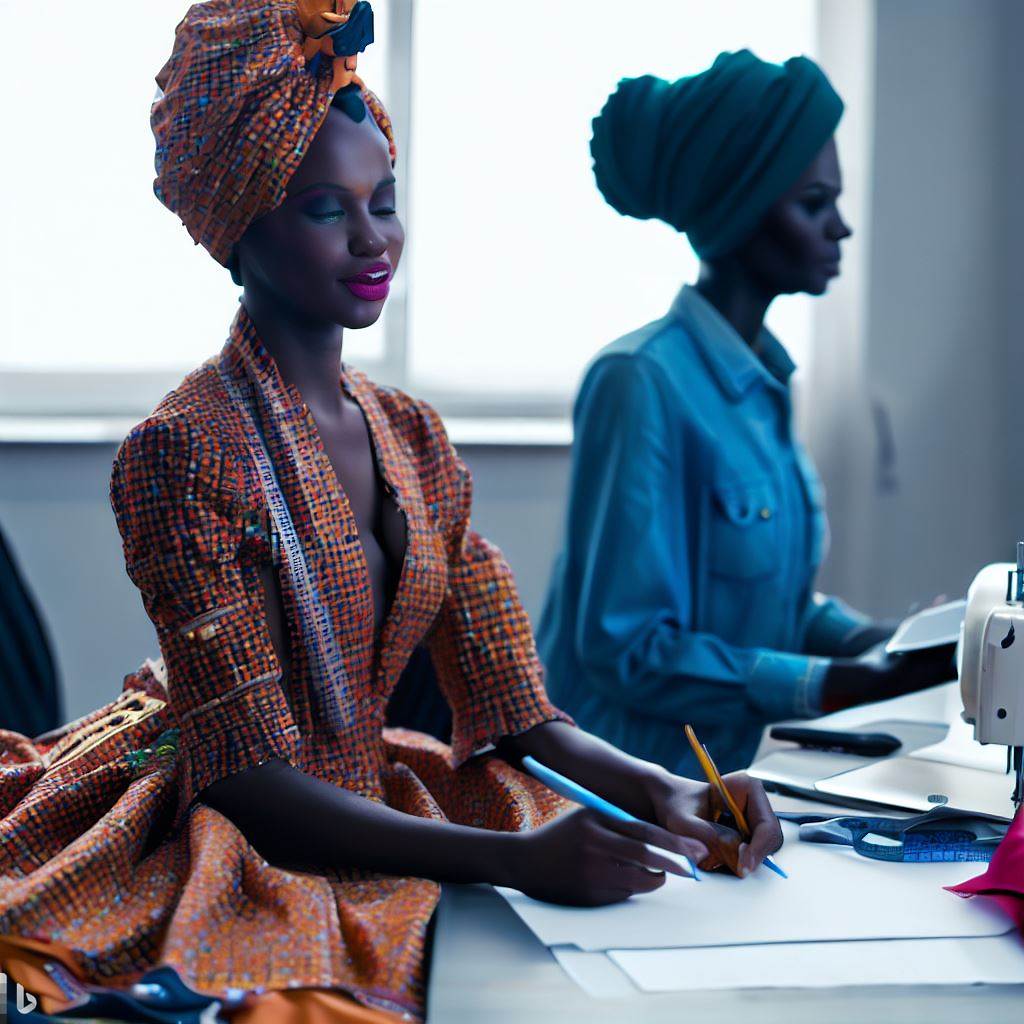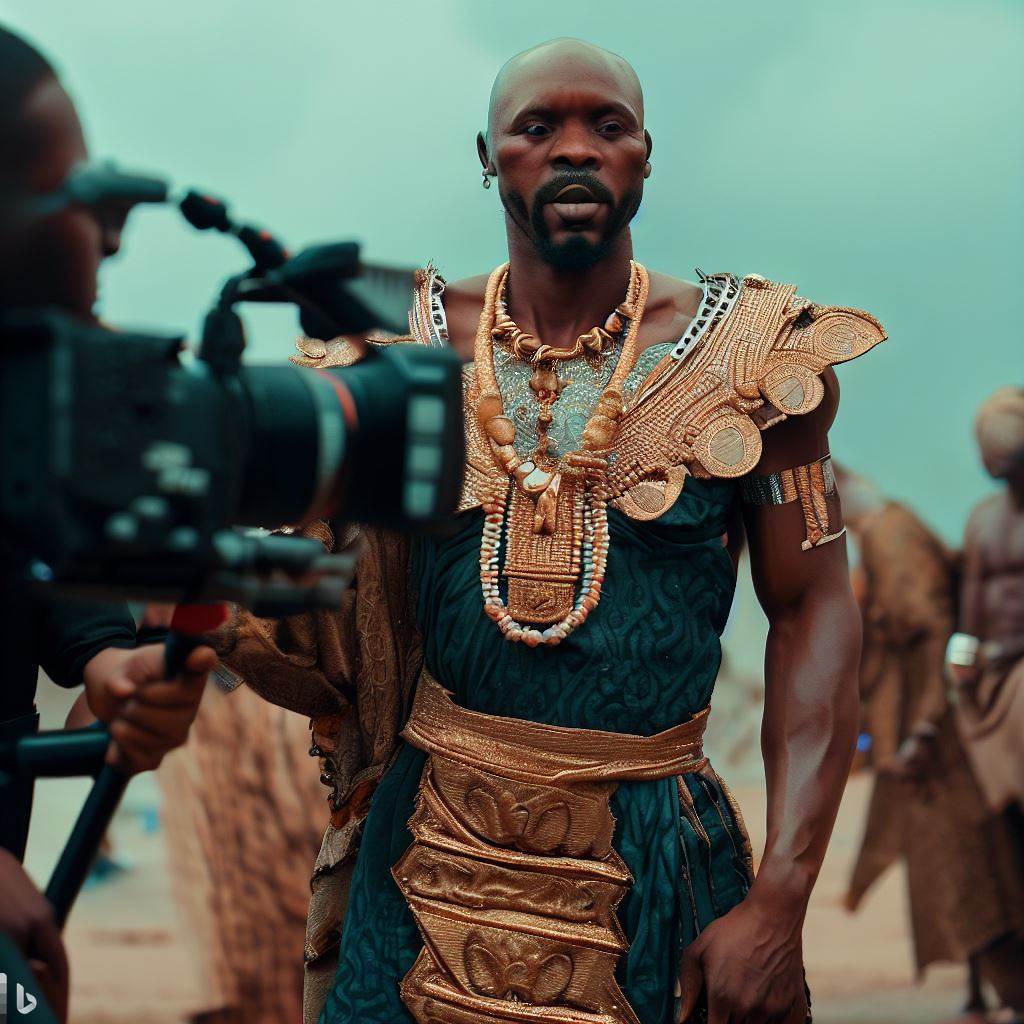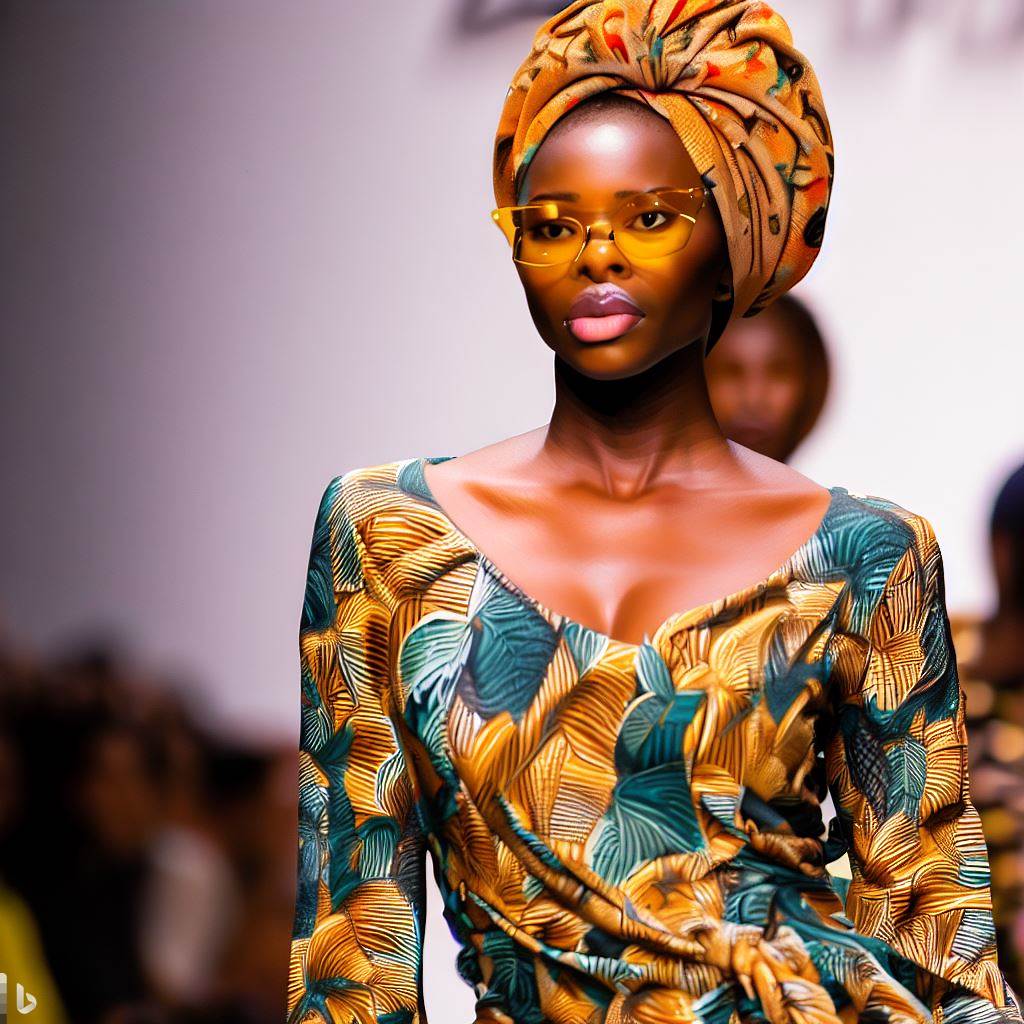Introduction
Costume designing refers to the art of creating and selecting costumes for characters in a production.
It plays a vital role in the entertainment industry, as costumes help bring characters to life and enhance storytelling.
In Nigeria’s thriving entertainment industry, costume design is essential, defining era, mood, and style.
It allows the audience to visually connect with the characters and understand their personalities and roles in the story.
Without well-designed costumes, the overall impact of a performance or production can be significantly reduced.
The Nigerian entertainment industry, often referred to as Nollywood, is one of the largest and fastest-growing film industries globally.
It encompasses movies, television shows, theater productions, music videos, and more. Nollywood has gained international recognition for its diverse storytelling and unique cultural perspectives.
This thriving industry provides a wide range of opportunities for costume designers to showcase their talent and contribute to the success of various productions.
In fact, costume designing is a vital aspect of the entertainment industry, particularly in Nigeria.
With the rapid growth of Nollywood, there is a high demand for skilled and creative costume designers.
As the industry continues to flourish, more employment opportunities are opening up for costume designers who can bring characters to life through their unique designs.
Exciting times await those who choose to pursue a career in costume design in Nigeria.
Current State of Costume Designing in Nigeria
Costume designing in Nigeria is currently facing several challenges and limitations, which hinder the growth and development of this creative industry.
This blog section will explore the lack of recognition and appreciation for costume designers, the limited employment opportunities available, and the various challenges they face in the industry.
Lack of recognition and appreciation for costume designers
- Costume designers in Nigeria often struggle to receive recognition and appreciation for their work.
- The general public and even some industry professionals fail to acknowledge the importance of costume designers.
- Their role in bringing characters to life and enhancing storytelling is often overlooked.
- As a result, costume designers are undervalued and their artistic contributions are not fully recognized.
- This lack of recognition leads to a lack of resources, funding, and opportunities for costume designers.
Limited employment opportunities
- Despite the vibrant Nigerian film industry, commonly known as Nollywood, costume designers face limited employment opportunities.
- Most film productions have small budgets, leaving little room to hire professional costume designers.
- Many filmmakers resort to using existing wardrobes or inexperienced individuals to handle costume designing.
- This practice undermines the quality and authenticity of costumes in Nigerian films.
- The limited employment opportunities force costume designers to seek alternative work or take on unrelated jobs.
Challenges faced by costume designers in the industry
Besides the lack of recognition and limited employment opportunities, costume designers in Nigeria face additional challenges.
- One major challenge is the lack of access to adequate funding and resources for costume production.
- Many costume designers struggle to source fabrics, accessories, and other essential materials for their designs.
- They often have to work with limited budgets, compromising the quality and creativity of their work.
- Another challenge is the lack of professional training and development opportunities for costume designers.
- Formal education programs specific to costume designing are scarce in Nigeria, making it challenging for designers to refine their skills.
- Additionally, costume designers face intense competition in the industry, as aspiring designers vie for limited opportunities.
In short, the current state of costume designing in Nigeria is marred by a lack of recognition, limited employment opportunities, and various challenges faced by costume designers.
Addressing these issues will require a collective effort from the industry, government, and society to provide support, resources, and recognition to costume designers.
Only by nurturing and empowering these creative professionals can Nigeria’s costume designing industry reach its full potential.
Read: Fashion vs Film: Costume Design Careers in Nigeria
Profiles of Successful Nigerian Costume Designers
Successful Costume Designers in Nigeria
- Olaoluwa Odukoya: Known for creating unique cultural costumes, Odukoya has won several awards.
- Ifeoma Umeokafor: Umeokafor’s designs have been featured in numerous Nollywood movies, gaining her recognition.
- Franklin Owuama: Owuama is renowned for his ability to incorporate modern fashion trends into traditional Nigerian costumes.
- Ugochi Emeghara: Emeghara’s intricate designs have been appreciated by both local and international fashion enthusiasts.
- Etim Usoh: Usoh is known for his exceptional attention to detail and the ability to create visually stunning costumes.
- Obioma Bertola: Bertola’s designs have been showcased in major fashion shows and cultural exhibitions.
- Nkiru Nwosu: Nwosu’s costumes have been worn by top Nigerian celebrities and have become iconic in the entertainment industry.
Their achievements and contributions to the industry
These successful Nigerian costume designers have made significant contributions to the industry.
They have elevated Nigerian fashion by infusing traditional elements into their designs and captivating audiences with their creative brilliance.
Their achievements and contributions highlight the importance of costume designers in Nigeria.
Olaoluwa Odukoya, with his distinct cultural costumes, has received praise and recognition for preserving and celebrating Nigerian heritage.
His designs have won several awards, recognizing his talent and dedication to promoting indigenous fashion.
Ifeoma Umeokafor’s work has graced numerous Nollywood movies, playing a vital role in bringing characters to life.
Her attention to detail and ability to transform actors into their roles have made her one of Nigeria’s most recognized costume designers.
Franklin Owuama has successfully blended modern fashion trends with traditional Nigerian costumes.
Through his designs, he showcases the beauty of both worlds and appeals to a broad audience, bridging the gap between traditional and contemporary fashion.
Ugochi Emeghara’s intricate designs have captivated fashion enthusiasts both locally and internationally.
Her creativity knows no bounds as she pushes the boundaries of costume design, creating visually stunning and unique pieces.
Etim Usoh’s exceptional attention to detail sets him apart as a notable costume designer.
His ability to bring characters to life through his costumes has made him a sought-after designer in the Nigerian entertainment industry.
Obioma Bertola’s designs have been showcased in major fashion shows and cultural exhibitions.
She has successfully fused modern fashion concepts with traditional Nigerian elements, making her a trailblazer in the industry.
Nkiru Nwosu has become synonymous with iconic costumes worn by top Nigerian celebrities. Her designs have created trends and set the bar high for future costume designers in Nigeria.
The importance of their work
- These successful costume designers have not only contributed to the growth of the industry but also showcased the richness and diversity of Nigerian culture.
- Their work has served as an inspiration to emerging designers, encouraging them to embrace their heritage and incorporate it into their creations.
In essence, the profiles of these successful Nigerian costume designers exemplify their achievements and the significant contributions they have made to the industry.
Their talent, creativity, and dedication have elevated Nigerian fashion and put it on the global stage.
The importance of their work cannot be overstated, as it allows for the preservation and celebration of Nigerian culture while also pushing the boundaries of creativity and innovation.
Read: Steps to Starting Your Costume Design Business in Nigeria

Potential Employment Opportunities
Areas where costume designers can find employment
Costume designers in Nigeria have a wide range of areas where they can find employment. Some of these areas include:
- Film and television industry: Costume designers play a crucial role in creating authentic and visually appealing costumes for movies and TV shows.
The demand for costume designers in this industry is constantly growing. - Theater and stage productions: Costume designers are essential in bringing characters to life on stage.
They create costumes that convey the personality, era, and mood of the production. - Advertising and fashion industries: Costume designers find opportunities in advertising and fashion, crafting standout outfits for ads, photos, and runways.
The growth potential in each sector
Each of these sectors offers tremendous growth potential for costume designers in Nigeria.
- Film and television industry: With the booming Nigerian film industry, commonly referred to as Nollywood, costume designers have a vast array of employment opportunities.
From blockbuster movies to TV series, the demand for costume designers in Nollywood continues to rise.
This industry provides costume designers with the chance to showcase their creativity and talent on both local and international platforms. - Theater and stage productions: Nigeria boasts a rich theatrical tradition, and there is a constant demand for costume designers in the theater industry.
From classic plays to contemporary productions, costume designers have the opportunity to collaborate with directors and actors to bring characters to life visually.
The theater industry provides a platform for costume designers to showcase their versatility and artistic abilities. - Advertising and fashion industries: The advertising and fashion industries in Nigeria are vibrant and rapidly growing.
Nigerian costume designers collaborate with top brands, blending tradition and modernity for captivating commercials, ads, and fashion.
Each sector provides a platform for costume designers to showcase their skills and creativity.
The continuous growth and development of these industries are expected to significantly increase the demand for talented costume designers in Nigeria.
Read: Costume Designers: Unsung Heroes of Nigeria’s Cinema
Steps to Pursue Employment as a Costume Designer
1. Education and Training Requirements
- Obtain a degree or certification in costume design from a reputable institution.
- Participate in workshops and seminars to enhance skills and knowledge in the field.
- Gain hands-on experience through internships or apprenticeships with professional costume designers.
2. Building a Strong Portfolio
- Create a diverse portfolio showcasing your best costume designs and projects.
- Include photographs, sketches, and descriptions of each costume to demonstrate your creativity and range.
- Showcase your ability to work with different themes, eras, and genres.
3. Networking and Establishing Connections
- Attend industry events, such as fashion shows, theater performances, and costume exhibitions, to meet professionals in the field.
- Join professional organizations for costume designers and attend their workshops and conferences.
- Seek mentorship from established costume designers who can provide guidance and opportunities.
4. Strategies for Finding Job Opportunities
- Utilize online platforms, such as job search websites and social media, to find costume design job postings.
- Build connections with theater directors, film producers, production companies, and event planners.
- Approach costume rental shops, theater companies, and production houses directly to inquire about job openings.
- Network with actors, dancers, and models who may require costume designers for their performances.
By following these steps, aspiring costume designers in Nigeria can increase their chances of securing employment opportunities.
Continuous learning, networking, and building a strong portfolio are crucial for success in this competitive field.
Embracing creativity, staying current with industry trends, and showcasing unique skills can distinguish costume designers and unlock opportunities for exciting projects and collaborations.
Overcoming Challenges in the Industry
1. Ways to increase recognition for costume designers
- Advocate for the inclusion of costume designers in mainstream media discussions and events.
- Encourage production companies to mention costume designers in the credits of movies and TV shows.
- Organize costume design workshops and seminars to showcase the skills and talents of designers.
- Collaborate with fashion magazines and bloggers to feature costume designers and their work.
- Establish awards or recognition programs specifically for costume designers in Nigeria.
- Engage with social media influencers to promote the importance of costume design in the entertainment industry.
- Lobby for the creation of costume design departments in universities and art institutions.
- Develop partnerships with theater groups and organize costume exhibitions to attract public attention.
- Showcase the impact of costume design on cultural preservation and identity.
- Encourage costume designers to submit their work to international film festivals and competitions.
2. Advocating for fair compensation and working conditions
- Educate employers and filmmakers on the value and complexity of costume design.
- Establish industry standards for fair compensation based on the complexity and scope of the project.
- Promote transparency in contract negotiations and ensure legal protection for costume designers.
- Collaborate with costume designers’ associations to advocate for better working conditions.
- Encourage the use of contracts that clearly outline the responsibilities and rights of costume designers.
- Inform costume designers about their legal rights and provide resources for dispute resolution.
- Organize panel discussions and forums to address the importance of fair compensation and working conditions.
- Encourage costume designers to join forces and negotiate as a collective voice.
- Conduct research on industry standards and present data to support the need for fair compensation.
- Highlight success stories of costume designers who have achieved fair compensation and improved working conditions.
3. Promoting collaboration and teamwork in the industry
- Encourage costume designers to collaborate with other industry professionals like directors and producers.
- Facilitate networking events where costume designers can connect with filmmakers and production companies.
- Promote the importance of teamwork by highlighting successful collaborations in the industry.
- Organize costume design competitions to foster collaboration and inspire creativity.
- Provide resources and platforms for costume designers to share ideas and collaborate on projects.
- Foster a culture of mutual respect and appreciation among costume designers and other industry professionals.
- Encourage filmmakers to involve costume designers in the early stages of production for better collaboration.
- Promote interdisciplinary collaborations between costume designers and other creative fields like fashion design.
- Advocate for the recognition of costume designers’ contributions in award ceremonies and industry events.
- Provide training and workshops on effective communication and teamwork for costume designers.
Generally, advocating recognition, fair compensation, collaboration, and teamwork can foster a thriving costume design industry in Nigeria.
It is important to recognize the valuable contributions of costume designers and ensure their work is appreciated and rewarded accordingly.
By collaborating, we can enhance the status of costume design and foster a more inclusive and vibrant entertainment industry in Nigeria.
Read: Innovation and Creativity: Keys to Nigerian Costume Design
Conclusion
In closing, the employment opportunities for costume designers in Nigeria are currently limited, but there is potential for growth and improvement in the industry.
Despite the challenges, we encourage aspiring costume designers to pursue their passion and leave a lasting impact in the field.
Skills, networking, and trend-awareness boost costume designers’ job prospects and industry growth in Nigeria.
Current State of Employment:
Employment for costume designers in Nigeria is gradually expanding, with opportunities in various sectors like:
- Nollywood: The thriving film industry demands skilled costume designers.
- Theater Productions: Stage productions continue to seek creative costume designers.
- Fashion: Collaborations with designers and brands are on the rise.
Freelancing:
Many costume designers find work as freelancers, offering flexibility and diverse projects.
Encouraging Aspiring Designers:
- Passion Pursuit: Aspiring costume designers should follow their passion and seek relevant training.
- Networking: Building connections within the industry can lead to valuable opportunities.
Potential for Growth:
- Industry Evolution: The costume design industry is evolving, driven by creativity and cultural diversity.
- Economic Impact: Costume designers contribute to the creative economy, driving growth in Nigeria.
- Global Exposure: International collaborations and film festivals offer exposure and recognition.
Finally, costume design in Nigeria is on an upward trajectory, welcoming new talent.
Aspiring costume designers should embark on their creative journey, as the industry holds immense potential for growth, innovation, and artistic expression.




